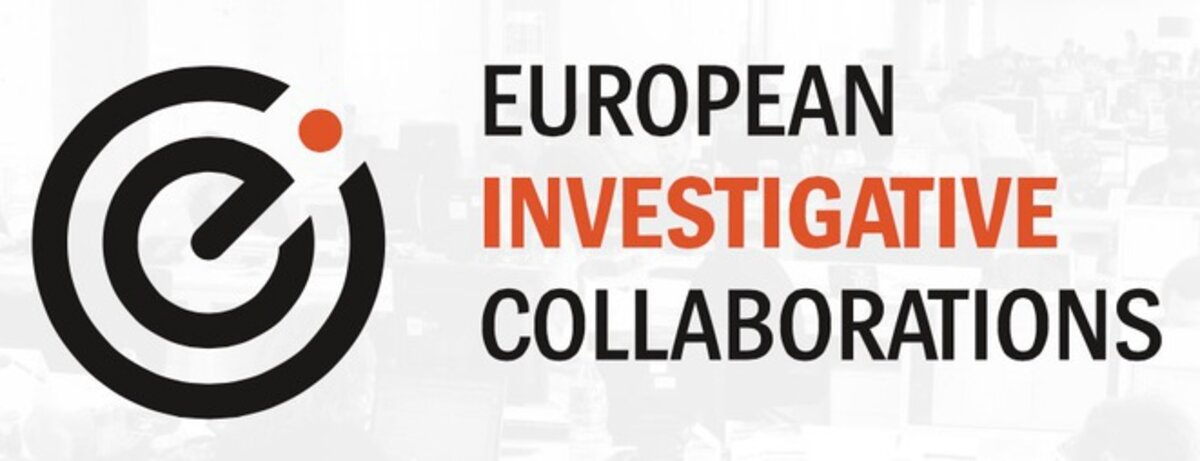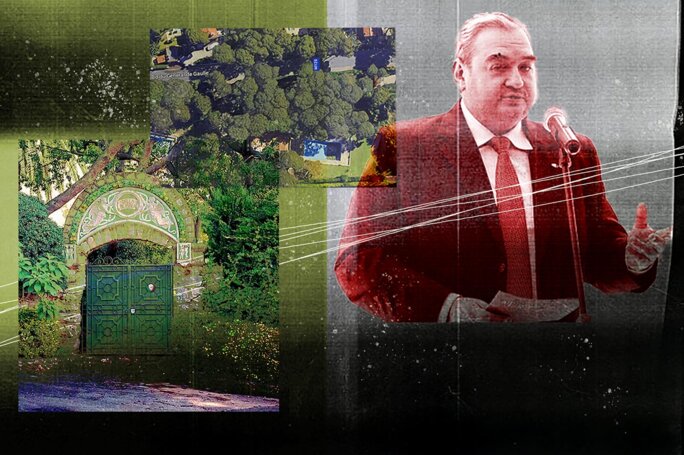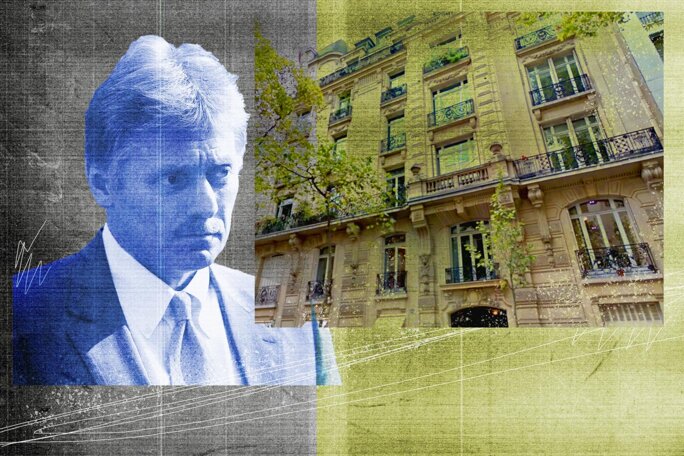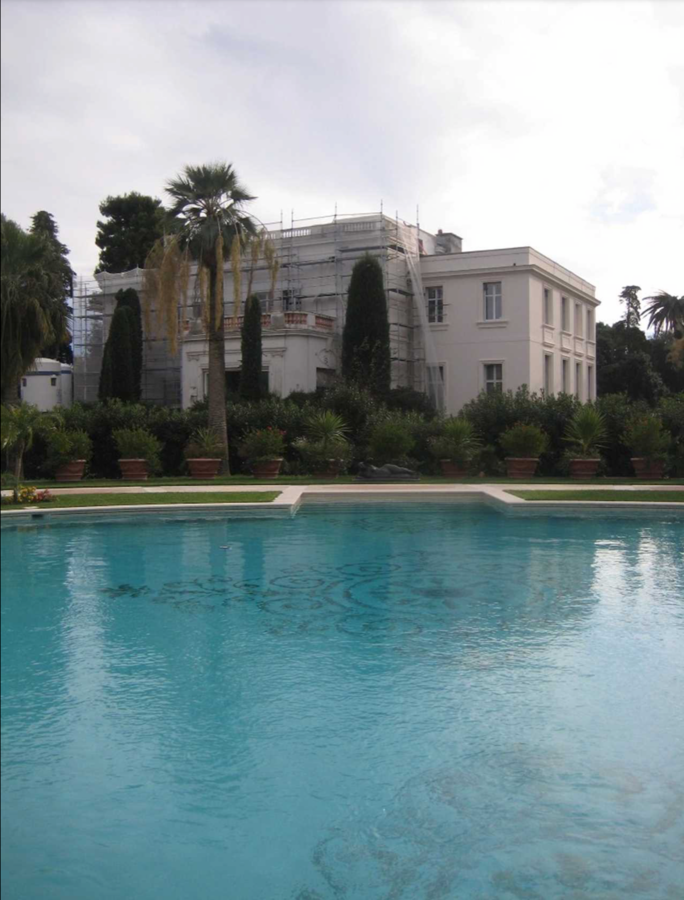It's a luxury residence, one among so many at Saint-Jean-Cap-Ferrat. Before the war in Ukraine this peninsular paradise on France's Côte d’Azur was one of the favourite holiday spots for billionaire Russians. This particular property is the Della Robbia villa, which was bought in 2004 by Andrey Zubitsky.
His family, whose wealth is estimated by Forbes magazine to be close to 1 billion dollars, controls the giant Russian company Industrial Metallurgical Holding (IMH), founded by his late father Boris Zubitsky, who was a member of the Russian Dumas and of Vladimir Putin's party.

Enlargement : Illustration 1

The imposing property, which is worth at least 25 million euros, looks out onto a peaceful driveway flanked by large pine trees. Along with the screen provided by vegetation, green tarpaulins have also been placed along the fencing to further protect the property from curious onlookers. Cameras monitor the main entrance and also the little access gateway which sits beneath a moulding of cherubs, surrounded by a stone wall.
The Russian oligarchs staying at Saint-Jean-Cap-Ferrat have always made their presence discreet. But since sanctions were imposed in February 2022 after Russia's invasion of Ukraine, Andrey Zubitsky has had good reason to hide himself away.
The villas of several of his illustrious neighbours, oligarchs such as Boris Rotenberg and Musa Bazhaev, have been frozen as assets by the French Treasury. His own brother, Evgeny Zubitsky, the CEO and major shareholder in IMH, was subjected to sanctions by the European Union on April 8th 2022, imposed because the company is regarded as a major “source of revenue” for the Russian government.
Yet Andrey Zubitsky himself can continue to use the Villa Della Robbia in complete legality. He has not been personally subject to sanctions even though he is involved, alongside his brother, in the running of IMH. He is the head of SIJ, its subsidiary in Slovenia, where it is the country's largest steel company, employing 4,000 people.
Zubitsky appears to have escaped the attention of the task forced set up by France's economy ministry to track down the assets of oligarchs. That task force includes tax inspectors, customs officials, others from the government unit that investigates clandestine financial movements, TRACFIN, and also senior officials from the Treasury.
France could have asked for the European Union (EU) to impose sanctions on the oligarch, or placed its own national sanctions on him. The Treasury could also have extended the sanctions already targeting his brother Evgeny to Andrey Zubitsky himself: the EU's European Council has pronounced that people close to sanctioned individuals can see their own assets frozen because of either “family” or business links.

Enlargement : Illustration 2

But Andrey Zubitsky's case is not an isolated one, as is revealed by an international investigation entitled RussianEscape, carried out by Mediapart in partnership with the German NGO Civil Forum for Asset Recovery (CIFAR) and the media network European Investigative Collaborations (EIC).
In France, Mediapart has identified several luxury properties that have not been frozen as assets by the French Treasury even though they belong to close family members of prominent figures who have been placed under sanctions, such as Vladimir Putin's spokesperson Dmitry Peskov.
How the family can help dodge sanctions
“In Europe today close relatives of sanctioned individuals can still serve as vehicles to evade the freezing of assets. Europe has not yet resolved this problem,” observed Clara Portela, who teaches political science at the University of Valencia in Spain and who specialises in multilateral sanctions, arms control and EU foreign policy. “Europe has not yet dealt with this problem.”
That observation is shared by the Russian Elites, Proxies and Oligarchs Task Force (REPO). This international group, of which France is a member, is charged with tracking Russian assets in G7 and EU countries, and has been behind the freezing of assets woth more than 58 billion dollars. The use of “family members and close associates” is one of the ways used to evade sanctions, REPO wrote in March.
The oligarchs also had time to prepare themselves. After the first wave of sanctions handed out in 2014 in the wake of Russia's invasion of Crimea, a number of them transferred their assets to frontmen or family. This was revealed in an investigation by French daily Le Monde into the brothers Arkady and Boris Rotenberg, childhood friends of Vladimir Putin.
When approached by Mediapart, the French Treasury declined to comment on the individual cases this investigation had unearthed. But France's finance ministry said that the current legal framework was not helpful. It said that the “restrictive measures to freeze assets are individual measures” that cannot be automatically extended to other family members.
This was made clear to EU member states in a judgement handed down by the Court of Justice of the European Union (CJEU) in March 2023. It annulled the sanctions imposed on Violetta Prigozhina, the 83-year-old mother of Yevgeny Prigozhin, boss of the private Wagner Group of Russian mercenaries who have been engaged in fighting in Ukraine, and who recently launched a short-lived rebellion against the Kremlin. The court ruled that evidence of links other than simple family ties between her and her son was “not sufficient to justify her inclusion” on the list of those facing sanctions.
In short, for a government to freeze the assets of an oligarch's family it must either prove that they are involved in their relative's business affairs or that they are being used to dodge sanctions. That requires “detailed examination, case by case”, explained Édouard Gergondet, a lawyer specialising in sanctions who works for law firm Hughes, Hubbard & Reed.
But he said the French Treasury itself “does not systematically carry out checks” on members of oligarchs' families. Instead, this task is largely sub-contracted to “commercial and financial operators” such as banks and notaries, who have a duty to alert the authorities of suspected wrongdoing.
These private operators, the Treasury insists, “display great vigilance […] including when the circumvention is carried out by an intermediary of those close to the person placed under sanctions”.
However, this investigation suggests there are gaps in the system.
The role of banks in question
The details of the case involving Andrey Zubitsky, owner of the Villa Della Robbia at Saint-Jean-Cap-Ferrat, could easily raise suspicions. He had a 51% stake in the company that owns the property, and the rest was owned by his wife. In September 2022, four months after sanctions were imposed on his brother, the couple reached a “partial agreement on the liquidation of their marriage settlement” and Andrey Zubitsky transferred his 51% stake in the company to his wife. She is now the sole owner, under her maiden name.
The result is that the links between the owner and the oligarch are more difficult to prove, and the Treasury would have found it hard to provide good grounds for freezing the asset.
One month earlier the oligarch had re-mortgaged the property for 24.8 million euros with the Monaco subsidiary of the French bank Société Générale. This action, which allows a loan to be obtained or extended by using the villa as collateral, is banned when the property is frozen as an asset, because it is a way of recovering its value in cash (the property effectively belongs to the bank until the loan is repaid).
Did Société Générale flag this operation to the French Treasury? The bank refuses to say, citing “professional confidentiality”, while stating that it respects “in a rigorous manner the legislation and rules in force and diligently implements the necessary measures, in coordination with the competent authorities”.

Enlargement : Illustration 3

Another troubling case involves Kremlin press secretary Dmitry Peskov, one of Vladimir Putin's most loyal followers and his spokesperson for 23 years. A cornerstone of the regime's propaganda, he describes the war in Ukraine as an act of “denazification” and refers to “fake videos” in his denial of the massacre at Bucha, the Ukrainian town close to Kyiv where mass graves were found after Russian troops retreated in March 2022. Sanctions were placed on him by the EU on February 28th 2022, four days after the invasion.
In 2016 his daughter and ex-wife bought a luxury apartment of 180 square metres in the upmarket 16th arrondissement, or district, of Paris. This was first revealed in 2017 in an investigation by Russian opposition leader Alexei Navalny, who escaped an assassination attempt by Russia’s secret services and who is now in prison serving a sentence of more than 11 years in what he has denounced as an attempt by the Kremlin to silence him.
The circumsatnces of the purchase of the Paris apartment were dubious from the start. It was bought for 1.77 million euros, of which 477,000 euros came from a loan by a Russian state bank, while the remaining 1.3 million euros was paid directly, while Peskov's ex-wife, Yekaterina Solotsinskaya, described herself as “unemployed”.
This investigation has uncovered that on March 8th 2022, just eight days after Peskov was placed under sanctions, his daughter Elizaveta transferred to her mother the 25% stake she had in the company that owns the flat, called Sirius, for just 250 euros. Two months later Elizaveta Peskova was herself placed under sanctions, on June 3rd 2022. The move to transfer the shares was, at the very least, opportune, as Yekaterina Solotsinskaya, who is now the sole owner of the apartment, is the only one of the three family members not to have been placed under sanctions.
Yet despite the suspicious nature of the transfer, the apartment and the company do not, at the time of publication of this article, feature on the list of assets frozen by the French Treasury.
The tools for investigations
On top of sanctions, the French government and Treasury have also used the law in a bid to target assets. According to Le Monde, since the start of the war in Ukraine, magistrates have launched 19 legal proceedings targeting the assets in France of Russian oligarchs, two of which involved yachts that were being used to get around sanctions and 17 others for laundering assets. Two of these proceedings are led by the financial crimes branch of the French public prosecution services, the Parquet National Financier (PNF) – one of them also involving suspected sanctions breaching – and the rest by JUNALCO, the branch of the Paris prosecution services tasked with fighting organised crime.
These proceedings, most of them triggered by alerts from TRACFIN, allow for a way around the legal difficulties faced by the Treasury in freezing assets because the judicial system has more effective investigative methods when seeking to dismantle complicated legal structures using figureheads and shell companies. It can also seize assets which are ultimately confiscated by the state if a conviction follows: in contrast, the freezing of assets is an administrative and usually temporary measure. The first such seizure under criminal law was obtained against the steel magnate Vikor Rashnikov, involving a villa at Saint-Jean-Cap-Ferrat.
One of the JUNALCO investigations is, according to Le Monde, targeting Farkhad Akhmedov. An oligarch close to Putin, Akhmedov was placed under European sanctions in April 2022. He is also at the centre of an investigation into suspected corruption opened by the PNF against Emmanuel Macron's former bodyguard and personal security advisor Alexandre Benalla, following revelations by Mediapart. In December 2018 the former Élysée official signed a contract worth 980,000 euros to provide security services to the oligarch.
Akhmedov bought a luxurious property at Saint-Jean-Cap-Ferrat in the 1990s for more than 20 million euros. It includes two villas with wooded grounds, a swimming pool and tennis court. However, he transferred the two properties to his ex-wife and his two children well before the war in Ukraine.
According to one of his French lawyers, Antoine Gautier-Sauvagnac, Akhmedov has not been the “owner or indirect financial beneficiary” of the properties “since 2020”. His other French lawyer, William Julié, said that Farkhad Akhmedov has “never been informed that an investigation against him is underway” and that his client “has committed no offence”.

Enlargement : Illustration 4

The judicial approach however does not solve all issues, as shown by the case involving Suleiman Kerimov (see more here and at the end of this report here). Kerimov, who became the target of a judicial investigation into tax evasion and money laundering led by magistrates in Nice, owned four luxury villas at Cap d'Antibes via a front company. He sold them for 286 million euros in 2019 to his daughter, who paid with money from her brother which in turn came from the family's group Polyus Gold, a major Russian gold producer.
In 2022, Suleiman Kerimov and his son were placed under sanctions but not his daughter Gulnara. To this day these properties have not been frozen as assets by the French Treasury. Mediapart has learnt that last January, Gulnara Kerimova was able to carry out, quite legally, a share issue with one of her property companies, raising a total of 1.6 million euros.
When contacted, her lawyer said that Gulnara Kerimova bought the villas “in complete transparency with the competent authorities in order to respect all the regulations” and that the capital increase or share issue “thus breaches no European sanctions”.
It remains to be seen if JUNALCO, to whom the criminal probe for money laundering was transferred, will succeed in seizing the assets. The public prosecution services did not respond to Mediapart’s request for comment.
Meanwhile, the European Council, the executive arm of the EU that is made up of heads of state and government, is trying to tackle the issue of apparent loopholes in the sanctions system. On June 5th, the Council adopted a regulation, with immediate effect, which is clearly aimed at dealing with the CJEU ruling that annulled the sanctions on Yevgeny Prigozhin's mother. The new regulation states that from now on all individuals who are “benefiting” from the wealth of a person facing sanctions, including their “immediate family members”, can be automatically placed under sanctions themselves.
Lawyer William Julié, who has sought to have the sanctions against Farkhad Akhmedov annulled, said he is shocked by the regulation which he argued is aimed at “circumventing” judicial oversight, and described it as an attack on fundamental rights. “It allows for the targeting of family members in a very broad way, potentially for previous financial transfers and with no connection to the war in Ukraine, without having to prove a business link with the person sanctioned or with an attempt to circumvent the sanctions,” he said. “It's a dangerous attack on fundamental rights, in which the Council is attempting to exempt itself from providing solid evidence.”
It remains to be seen whether the European Council, which votes on the lists of people to be sanctioned, is going to apply this new weapon extensively. Also in question is whether this extension of sanctions to the families of oligarchs will be approved by the Court of Justice of the European Union.
-------------------------
- The original French version of this article can be found here.
English version by Michael Streeter


